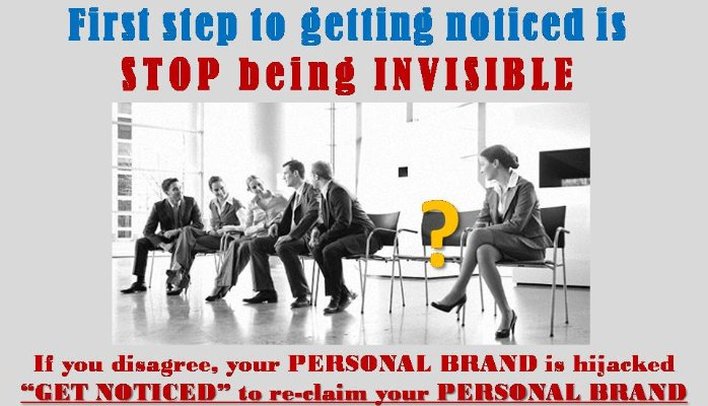
When you understand how the corporate system really works, you will know exactly what to do and more importantly what not to do.
You start to own up your job & start thriving.
You can begin to focus on what matters so you move up the corporate ladder and stop getting passed over for promotion and raise year after year. But, soon you realize doing "good work" is no more sufficient to GET NOTICED and move ahead in your professional career. Such times are critical in anyone's career as feeling of not getting recognized in spite of doing exceptional work can harm ones' career and organization equally.
Here are 5 common reasons which are most likely keeping you INVISIBLE at work in spite of doing good work. And, as long as you stay INVISIBLE, career growth is not possible.
1. Like everyone, you expect your work to speak for itself: That's the age old problem haunting a lot of professionals in their career. I hate to tell you that "Your work doesn't speak for you, it only speaks for itself i.e. work; only you have to speak for yourself." You need to not only speak for what you have done but also how much value it is bringing to the company. Stop being INVISIBLE, start getting recognized.
2. Your relationship with your boss: It works 2 ways, one it seems terrible but you have a professionally good relationship with boss and secondly you actually have a terrible relationship with boss. If you have a professional relationship with your boss but somehow its not working then look again: Are you too friendly with him? A lot of times in such scenarios you may end up surprising, embarrassing, or correcting your boss in public. Bosses do not like surprises (even the good ones), and you could ruin your trust with him. In public, don’t correct, criticize or embarrass your boss EVER! On the other hand, if you really have a terrible relationship with your boss, it requires urgent intervention beyond scope of present discussion!
3. You are yet to have a company owner mindset: If you see yourself as just an employee, or as someone working for the company, then your employer will see you that way. You do your work and expect to get paid. You follow guidelines and want to get rewarded. But if you start to think like a company owner, you become the company. That’s when your employer notices you almost immediately and puts opportunities out there for you to succeed. You should think from a strategic perspective, stop thinking too small if you want to get noticed.
4. You complain, criticize or gossip: The number one career suicide mistake is an attitude of complaining, criticizing, gossips and a sense of entitlement. If you do any of these even on occasion, you are sabotaging all your hard work. Don’t fool around with your career here. Cut this out immediately and start doing damage control today. I have personally seen, very highly deserving senior hierarchy professionals being ignored due to some 'cafeteria chat'!
5. You don't project yourself confidently: Being confident is one thing and letting people know of your confidence is a totally different ballgame altogether. It goes way beyond your work ethics. Things like dressing, posture, presentation skills, body language, communication skills, assertiveness and positive attitude are just some of the absolutely necessary factors that determine your "confident look" to your boss & management.
You start to own up your job & start thriving.
You can begin to focus on what matters so you move up the corporate ladder and stop getting passed over for promotion and raise year after year. But, soon you realize doing "good work" is no more sufficient to GET NOTICED and move ahead in your professional career. Such times are critical in anyone's career as feeling of not getting recognized in spite of doing exceptional work can harm ones' career and organization equally.
Here are 5 common reasons which are most likely keeping you INVISIBLE at work in spite of doing good work. And, as long as you stay INVISIBLE, career growth is not possible.
1. Like everyone, you expect your work to speak for itself: That's the age old problem haunting a lot of professionals in their career. I hate to tell you that "Your work doesn't speak for you, it only speaks for itself i.e. work; only you have to speak for yourself." You need to not only speak for what you have done but also how much value it is bringing to the company. Stop being INVISIBLE, start getting recognized.
2. Your relationship with your boss: It works 2 ways, one it seems terrible but you have a professionally good relationship with boss and secondly you actually have a terrible relationship with boss. If you have a professional relationship with your boss but somehow its not working then look again: Are you too friendly with him? A lot of times in such scenarios you may end up surprising, embarrassing, or correcting your boss in public. Bosses do not like surprises (even the good ones), and you could ruin your trust with him. In public, don’t correct, criticize or embarrass your boss EVER! On the other hand, if you really have a terrible relationship with your boss, it requires urgent intervention beyond scope of present discussion!
3. You are yet to have a company owner mindset: If you see yourself as just an employee, or as someone working for the company, then your employer will see you that way. You do your work and expect to get paid. You follow guidelines and want to get rewarded. But if you start to think like a company owner, you become the company. That’s when your employer notices you almost immediately and puts opportunities out there for you to succeed. You should think from a strategic perspective, stop thinking too small if you want to get noticed.
4. You complain, criticize or gossip: The number one career suicide mistake is an attitude of complaining, criticizing, gossips and a sense of entitlement. If you do any of these even on occasion, you are sabotaging all your hard work. Don’t fool around with your career here. Cut this out immediately and start doing damage control today. I have personally seen, very highly deserving senior hierarchy professionals being ignored due to some 'cafeteria chat'!
5. You don't project yourself confidently: Being confident is one thing and letting people know of your confidence is a totally different ballgame altogether. It goes way beyond your work ethics. Things like dressing, posture, presentation skills, body language, communication skills, assertiveness and positive attitude are just some of the absolutely necessary factors that determine your "confident look" to your boss & management.

 RSS Feed
RSS Feed